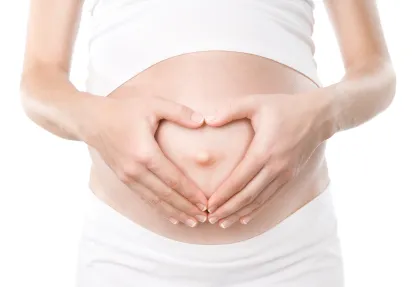Bleeding or spotting can occur at any stage of pregnancy. It does not always involve danger to the fetus, but every time it is certainly a great stress for the mother-to-be. Scanty spotting in pregnancy or heavy bleeding should always be consulted with a doctor to find out the cause and be able to react appropriately in case of abnormalities. Learn more about bleeding and spotting in pregnancy, see when such symptoms can be dangerous and when they are even natural.
Spotting in pregnancy – vaginal bleeding in pregnant women
When discussing the topic of bleeding in pregnancy and spotting in detail, it is useful to characterize them accurately at the outset, so that the pregnant woman can distinguish between them. Pregnancy bleeding is much more profuse, can be red or brown in color and resembles menstruation. Spotting in pregnancy is usually scanty. This is a vaginal discharge mixed with blood, which can be seen on a sanitary pad or toilet paper.
Spotting at the beginning of pregnancy – causes of bleeding in the first trimester
Did you know that in the early stages of pregnancy spotting or bleeding occurs in up to 20% of women? Most often, they are not associated with disease or a threat to the health or life of the mother and fetus. Sometimes, however, they signal serious problems. The cause of bleeding in early pregnancy can be:
ectopic pregnancy
(ectopic), when a fetal egg has implanted outside the uterine cavity. In such a situation, a miscarriage is most common, and if not, the ectopic pregnancy must be removed, as it poses a real threat to the woman’s life,- Miscarriage, or embryonic death. In the first trimester of pregnancy, the most common causes of miscarriage are genetic defects of the fetus, trophoblast defects, infections, polycystic ovarian syndrome or an abnormal lifestyle of the mother. Miscarriage in early pregnancy is manifested by heavy bleeding and crampy abdominal pain.
Other causes of bleeding at the beginning of pregnancy or spotting may include:
- Irritation during a gynecological examination,
- A lesion on the cervix (such as a polyp),
- erosion,
- subclavian hematoma,
- Rupture of a blood vessel after exertion (for example, during bowel movements during constipation),
- progesterone deficiency,
Nesting of the embryo in the uterine cavity
(implantation bleeding).
Spotting at the beginning of pregnancy – when is it normal?
Does a little spotting in pregnancy have to worry? It turns out not because such an ailment does not always herald illness or a threat to pregnancy. Moreover, it is during the first trimester of pregnancy that spotting and even bleeding occur most often. Causes of spotting or bleeding in early pregnancy, which absolutely should not worry moms-to-be, include:
- Implantation bleeding (implantation of the embryo in the uterus),
- Spotting or bleeding in pregnancy after intercourse,
- spotting or bleeding in pregnancy after a gynecological examination.
If the ailment is prolonged or accompanied by other symptoms, including abdominal pain, the pregnant woman should immediately go for a gynecological consultation. Even mild spotting and bleeding during the first trimester of pregnancy should never be underestimated, and the doctor should undertake a detailed diagnosis of the problem.
Pregnancy bleeding instead of menstruation
Safe spotting during pregnancy occurs much more often than heavy bleeding, which unfortunately can herald serious medical problems. Light bleeding and mild abdominal pain can indeed occur in a pregnant woman on the date of her expected period. As a rule, it occurs when a fertilized egg cell nests in the uterus.
The so-called. Implantation bleeding generally lasts a few hours, although it can extend to as long as 3 days. This is why it happens that the implantation of the embryo is mistaken for menstruation. It is also worth mentioning that this kind of early pregnancy symptom does not occur in every woman.
Pregnancy risk – can bleeding affect pregnancy?
Brown spotting and even bleeding in pregnancy most often do not affect the risk of miscarriage. To find the cause of such symptoms, the pregnant woman should undergo specific tests. Most often, the doctor orders:
- gynecological examination,
- ultrasound,
- Blood tests including assessment of hormone levels.
Importantly, it is not always possible to find the direct cause of spotting in pregnancy. In such a situation, the pregnant woman may be hospitalized to monitor her and the baby’s health on an ongoing basis.
Pregnancy bleeding after intercourse – can it occur?
Bleeding or spotting in pregnancy can occur in any trimester, and the cause may be irritation of the vaginal walls. Keep in mind that after conception, they are much more blood supply and sensitive. This symptom is not the reason why you need to exercise sexual restraint during pregnancy. However, it is always a good idea to mention it to the doctor in charge of the pregnancy, perhaps he will recommend a change of position.
Bleeding in early pregnancy vs. miscarriage
The loss of a pregnancy before the completed 22nd week is called a miscarriage. It turns out that unfortunately up to 20% of pregnancies are lost, and in the early stages of pregnancy the woman is not always aware of this. Is it possible to recognize a miscarriage? What ailments are most common that can herald a miscarriage at the very beginning of pregnancy? Symptoms of spontaneous miscarriage include:
- heavy bleeding,
- blood clots,
- severe abdominal pain,
- dizziness,
- cessation of typical pregnancy symptoms.
If a miscarriage is suspected or when there is a risk of miscarriage, a woman should see a doctor immediately. After a miscarriage, it may be necessary to clean the reproductive tract to avoid complications.
Bleeding after gynecological examination in early pregnancy
Since the vaginal walls of pregnant women are very sensitive, they can become irritated during a basic gynecological examination. Such trauma to the reproductive tract is not dangerous, there is no danger of miscarriage. After a gynecological examination, spotting usually occurs for a maximum of several hours.
If mild spotting in pregnancy turns into heavy bleeding with dark blood, and the woman is accompanied by lower abdominal pain, she should see a doctor.
Pregnancy risk: heavy bleeding with dark or light blood in early pregnancy
Pregnancy bleeding from intimate areas is much more worrisome than brown spotting. Unfortunately, bleeding in early pregnancy can herald not only a miscarriage, but also a number of health problems for the pregnant woman herself. What matters is not only the intensity of the discharge from the genital tract, but also its appearance. What does the shade of brown, pink or red mean?
- brown spotting – this is “old” blood, which most often is not the cause of any worries for the parents-to-be. As a rule, it appears in early pregnancy,
- pink spotting – is typical in the early stages of pregnancy, when the embryo is implanting, but also before the actual delivery, for example, as a result of physical exertion. Unfortunately, spotting in pregnancy with a pink tint can also be a harbinger of miscarriage,
- red bleeding in pregnancy – its cause may be trauma to the genital tract, for example, after a gynecological examination or after intercourse. If bleeding in any period of pregnancy is heavy, accompanied by abdominal pain, it requires immediate medical intervention. It may involve pregnancy loss.
Bleeding in the second half of pregnancy – spotting in advanced pregnancy
Although spotting and bleeding mostly occur in early pregnancy, this type of discomfort can also occur in advanced pregnancy. While harmless causes of spotting at any stage of pregnancy involve, for example, irritation of the walls of the genital tract after intercourse or a medical examination, extreme vigilance should always be exercised in the second and third trimesters of pregnancy. Bleeding in pregnancy can also occur due to dangerous consequences, such as:
- uterine rupture,
- Premature separation of the placenta,
placenta progenita
,- diseases in the lower uterine region.
In such cases, the immediate intervention of a doctor who is competent in the field of expertise is necessary. Bleeding in advanced pregnancy can herald impending labor, but also dangerous complications that will lead, for example, to fetal hypoxia.
FAQ
- What does spotting in pregnancy mean?
The causes of spotting in pregnancy can vary. Most often this symptom occurs in early pregnancy and is not dangerous. Pregnancy spotting can occur during embryo implantation or after irritation of the genital tract, such as after intercourse or after a gynecological examination.
- When can pregnancy spotting or bleeding herald a threat of miscarriage?
The intensity of discharge from the genital tract is significant. If there is heavy bleeding that does not stop and accompanied by abdominal pain, the pregnant woman should immediately go to the doctor. Pregnancy miscarriages most often occur in the first 12. Weeks.
- Is pregnancy bleeding after intercourse dangerous?
As a rule, bleeding in pregnancy after intercourse is not dangerous and can occur at any stage. It often results from irritation of the vaginal walls, which is not associated with danger. Pregnancy bleeding after intercourse should be consulted with a doctor to rule out cervical disease, ectopic pregnancy or the risk of complete separation of the placenta.
Rate this article:










